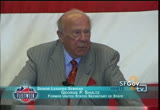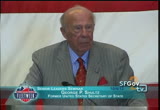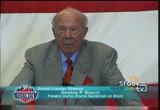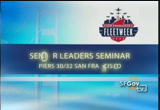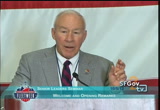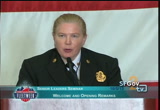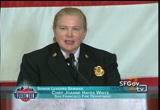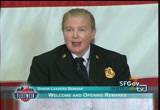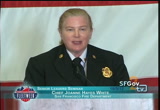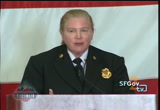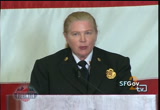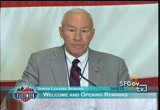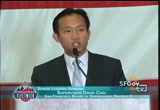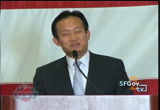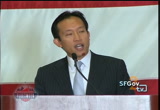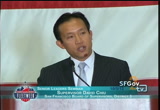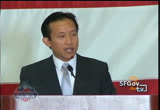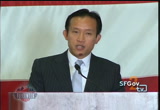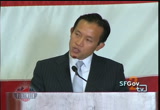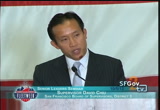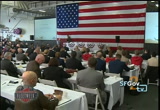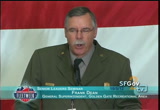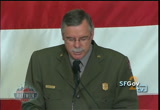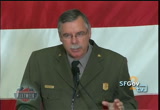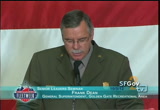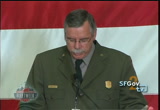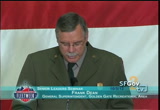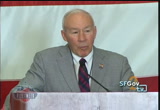tv [untitled] January 19, 2013 4:00am-4:30am PST
4:00 am
and security commons from which we all have benefited and continue to benefit. [speaker not understood]. so, we have to keep working at it. and i think the things that have been talked about here are very much in the line of keeping [speaker not understood]. niche a was mentioned this morning. that was a fantastic piece of work by the navy. it turned around the attitudes of niche a toward the united states. it was a the kind of building block we look for in an economic and security commons. just as when we in san francisco see not only what the military can bring to the party
4:01 am
and help us with, not only how we can interact with the military, but also we say to ourselves, it's also up to us to do everything we can for ourselves. we're not kind of an outfit, it's easier for them to collaborate with us. so, all of these things are important to us as we have these exercises. so, i say this is a very worthwhile enterprise that will keep going. i tip my hat to my friend mike who really has been leading us in these efforts. and now i say as also the slogan, i guess you call it this morning, maybe it's what the navy says. i think it's a very good phrase. a global force for good. that's what we've been practicing, a global force for good. thank you. (applause) >> thank you, sir.
4:02 am
thank you. thank you very much, sir. (applause) >> and for all of you, tomorrow we're going to have the former secretary defense william perry speak. and the final speaker tomorrow will be the commander of north com, it will be the first time the northern command... >> ladies and gentlemen, welcome to day two of the
4:03 am
senior leader seminar for san francisco fleet week 2012. we had a great day yesterday and we're going to have an even greater day today. we've got a number of people that i would like to bring up to welcome you all. while this senior leader seminar is going on, there's a number of other activities that are going on at the same time. and a very important activity is some training that's taking place on treasure island. it's training by the san francisco fire department and it's become a huge hit with the marines and the sailors that are able to get this training. with that, i'd like to have our police chief -- fire chief from san francisco, chief hayes white, come forth and talk to you about some of these events and the fire department's role. thank you.
4:04 am
>> thank you, thank you very much. thank you, general. good morning, everyone. welcome to san francisco. this is day two of the senior leaders seminar. i had the opportunity to sit through most of the seminar yesterday. i found it very informative, and would certainly like to again echo our thanks and appreciation to admiral beaman and captain pringle on the beautiful uss macon island. if we could give applause to all the men and women serving on this ship, thank you for your hospitality. (applause) >> this is a week where we highlight and celebrate all the sacrifices that military personnel make. in the san francisco fire department, we work 24/7 shifts. we're considered para military, but we recognize in the military the great sacrifices that you make each and every day to protect our freedom
4:05 am
while being away from your homes and your family. so, thank you very much. it's an honor to welcome you to san francisco. (applause) >> i'd also like to acknowledge the presence of two people that i consider honored to call friends, and they continue to be treasures to san francisco, to our city, to our state, and to our nation. and i was so impressed yesterday that both of them intently sat here yesterday taking it all in. and it was the highlight really i think of the seminar to have the evening closing remarks capped off by former secretary of state george schultz. so, thank you very much, sir, for being here. (applause) >> it is a wonderful partnership that he shares with his wife who is chief of protocol for our city and our state, charlotte schultz. so, thank you very much. (applause) >> certainly this partnership
4:06 am
couldn't take place without all of the heavy lifting and hard work done by the san francisco fleet week association. so, thank you to general myatt for your vision. this is your three of not only the celebration events, but what you spoke to earlier. also the executive director of the fleet week association lewis lubin. thank you very much. (applause) >> i've had the pleasure of serving in the san francisco fire department for 22 years. it will benign years in nine since i stepped up and took the role of chief of the department. i continue to be proud of that. and i can say which i said earlier in the week, the coordination and the collaboration only gets better each year that we do this. and i'd also like to acknowledge the department of emergency management and all of her staff for coordinating so seamlessly with the fleet week association in addition to all of the other events that we have that's going on this week. so, thank you to our department of emergency management. (applause)
4:07 am
>> as we discussed, it is so important to not only build relationships, but to strengthen them. and that is exactly what we're doing here this week. i'm also very proud that the fleet week association has once again included our community partners. as you know, in 1989 there was the loma prieto earthquake. we had many show up and go to work. we realized we were quickly overwhelmed and had limited resources. after loma-prieta was an educational piece to partner with our community. and the fleet week association has invite and had there are so many of them here, i'm very proud of our neighborhood emergency response team training folks that are here today. my hat is off to you because we couldn't do it without your dead gaytion -- dedication and volunteerism. so, thank you to our nert members here today. (applause) >> and i'm so proud to continue to be partnering with our
4:08 am
military personnel when it comes to humantarian assistance and disaster relief. i was literally in awe on wednesday on ocean beach with the landing of the lcac and also to take a look at the capabilities and the resources that we would have available to us in the event of a large-scale emergency. my hat is off to all of you with just how well you've planned, your multitude capabilities, and as secretary schultz said i'll take a note from his confidence of display. to see how you set up in an hour a field hospital to take care of patients, not run of the mill patients, but critically wounded patients. we were so impressed. i think a couple other words the secretary used were impressive and reassuring. that's what it's about, forming partnerships. so, i'm very proud to be not only to be honoring and celebrating our military, but to be partnering once again in cross training. happy to report that a little
4:09 am
later today aboard the uss macon, we're learning the best. firefighting below the deck, members on the flight deck learning about aircraft rescue, firefighting. similarly, and i won't be able to stay the whole day today because soon i'll be headed over to treasure island, a former navy firefighting school, we'll have that facility about 14 years and we'll be welcoming 40 members from the u.s. marine corps, 20 members from the u.s. navy, 10 members the u.s. coast guard, where we will then partner with them and cross train them and use our techniques, reaching technical rescue and high and low rescue being demonstrated in display. we will also be having some of our u.s. navy personnel on ride-alongs with members on our ambulances, fire engines and trucks to continue with our cross training. so, it gives me great pride to
4:10 am
be here to continue to serve as the fire chief, to welcome the military, and to say thank you to all of you. here's to an enjoyable fun-filled busy weekend. all the best, and thank you for your service. (applause) >> i wanted chief to tell you about that training. we first did it in 2010, search and rescue which we knew was a problem in haiti in the earth wake in the recovery. and like they say in san francisco, the fire department, we know how to do it, but when the big earthquake hits, we're all going to be victims and we want to make sure that anybody that potentially could come in to help dig us out knows how to do it. well, we trained some marines and petty officers in 2010 and as fortune would have it, i think u.s. s. reagan was in japan after their earthquake,
4:11 am
there were a couple petty officers who had undergone that training were sent ashore in japan to assist in some of the urban search and rescue training. so, it was real world application. before i bring the next welcomer up, i have some administrative remarks. there are rest rooms here. and today i want to make sure you know it's back behind those screens for people that weren't here yesterday. and, of course, there's coffee there. this is a busy week and a busy weekend, and it's a core i -- choreography with all the ship movements. i can't let it go further without thanking monique moyer for what she and her folks have done to make this such a wonderful fleet week. (applause) >> our next welcomer, and this has really been exciting for me because i didn't think it would
4:12 am
happen, but it came last year and he's become a great supporter and he happens to be the supervisor where most of the activities are taking place in the city. but he's also the president of the board of supervisors. i'd like you to welcome david chiu. (applause) >> glad to have you here. >> glad to be here. good morning. on behalf of the san francisco legislative body, our board of supervisors, i want to welcome you to our city of san francisco. and i first want to also echo what our fire chief just said as far as welcoming all of you who have been serving our country and the world in uniform. i want to thank those of you who helped to run our first responder departments around the bay area. i want to thank those of you who are our volunteers, our note programs here. and of course want to thank and welcome our san francisco secretary of state and the
4:13 am
woman who manages and orders around that secretary of state, charles m. charlotte schultz. (applause) >> now, this week as you know, there is a lot going on here. and in addition to welcoming you here at the scenier leader seminar, i want to tell you we were so excited that the sls would be here that we decided this weekend to also require the americas cup to celebrate -- to require the san francisco giants to have a play off game, the 49ers to play this weekend, the blue grass festival to be here, the parade, as well as the castro sea fair to coincide and welcome you in style. but i wanted to say a few words about the one thing that keeps me up as the head of the legislative body here in san francisco. the reason why i sit with many of our first responders on our
4:14 am
city's disaster council, the reason why a few years ago chief white and i led almost a half a billion dollar bond campaign to rebuild the water, fire, and police infrastructure. about every six months i literally wake up in the middle of the night thinking about what would happen if a disaster struck our city. and i think about this and i think i have these nightmares really for three reasons. one, everyone who lives in san francisco knows that in 1906 we were hit not just by an earthquake, but by an earthquake that led to a fire that burned down literally every single neighborhood in the district that i currently represent in the northeast part of san francisco. another reason why i wake up in the middle of the night, though, has to do with an experience i had 7 years ago in 2005, which i think i might have shared with some of you here on this ship today. in november of 2005 i was asked when i was running a technology
4:15 am
company before i joined the board of supervisors to show up at the city of the site of a client. that city was new orleans. this was a few weeks after hurricane katrina, which we all know will be probably the greatest civil engineering set of blunders that our country has made in our country's history. and what we all learn from hurricane katrina is what happens when we don't have a community that is prepared and a set of relationships that is ready to be hit by the big one. which leads me to the third reason why i wake up at night. the neighborhoods that i represent in the northeast not only represent the oldest neighborhoods in our city, but some of the most vulnerable. we have some of the poorest residents. half of my district are recent immigrants who are mono lingual. i have hundreds of constituents
4:16 am
who live in buildings that contain them where they live three, four, five people in a room that might be no larger than 10 by 15 feet, in buildings that are absolutely prone to earthquake, fire, and the next major disaster. and, so, i was asked to just mention if i had three things that i want you to tell us as your civilian leaders. the first has to do with how to deal with community shock. two nights ago as a couple of you commented, you may be wondering why i have a bandage on my hand and i look like i got into a fight at a bar. i happened to spend a couple hours in one of our city's finest emergency rooms after a minor bike accident. and it is minor, no broken bones, i'm fine. but what is interesting to me in my experience of getting knocked off my bike was that for about an hour or two after the accident, my body was shaking uncontrollably. i was experiencing what i later
4:17 am
learned on wikipedia was the phenomenon known as shock. and we know as a community that when the next disaster hits us, not if, but when, our community will go into shock. in fact, we market this in our local efforts as the 72 hours. the 72 hours that hits any community, when we know that disaster responders are still getting together their infrastructure. and what i want all of you to tell us is what are those best practices that you have been studying and you have been talking about that can help us not just in that first hour, but in that first 72 hours, what is it that i need to be educating our community on during that time period? the second thing i want to ask you is, how our military can better work with our first responders and our civilians. again, not just in that 72 hours, but in the weeks and the months ahead. i participate in many drills with our civilians, with our
4:18 am
volunteers and our police and fire departments and our department of emergency management in how to be prepared. but obviously because of the work that the military does every day, saving the rest of the world, we don't work with you quite so regularly. in a conversation that i had with general maya in recent years is how can we best put to use the thousands of returning veterans that we have here in our midst who already have the training and the experience to take care of the world? how did we put our veterans best to use in taking care of us in a future disaster? the third thing i want to ask of you is to help us think about lessons around recovery. in the wake of new orleans, our city government started looking at how we prepare our self. and one thing we discovered was, as you all know, the relationships that exist on the ground between civilians and between our first responders, really will help to dictate our
4:19 am
success in tackling not just our response, but our recovery. and this is why last year in my district, in the heart of north beach which i hope many of you will have a chance to visit, we set up a coordinating council, and this is a council made up of local residents, neighborhood associations, merchant groups, churches, nonprofit organizations, city officials, and first responders. the task of this local coordinating council was to figure out how do we deal with that first 72 hours and how do we recover? and we've learned an awful lot as we've developed these relationships and how do we avoid the mistakes that were made after hurricane katrina? but what we've also found is that by simply convening these groups, we are preparing ourselves not just for what happens after a disaster, but we are literally building our community today.
4:20 am
with this coordinating council, we're figuring out how to fix the potholes, how to deal with the literally million people who are going to descend on our neighborhood this weekend, how to take care of the needs that we have, not just in the future after the big one, but today in 2012. and by bringing us together today, by tackling and talking about the problems we'll deal with tomorrow, we're actually achieving many things here at this moment in october. and, so, i want to ask you to think about how it is that you can help us to build these infrastructures, how you can help us to build community so that we're keeping ourselves safe today, this month, this year, and for many, many years to come. so, with that, again, i want to thank you for being here. and we as a civilian leadership of the city and county of san francisco look forward to hosting hopefully many seminars like this into the future so we can all work together to keep our city, our state, our country, and our world much safer. thank you for being here. (applause)
4:21 am
>> thank you, supervisor chiu. on wednesday we had an lcac or big hover craft land across ocean beach. that would have not been possible without the cooperation of the park service. i would like to introduce frank dean, he's the general superintendent of the golden gate recreational area and these going to talk for a few minutes about these marvelous parks that we have in the area that much of what is being occupied by fleet week. mr. dean. (applause) >> thank you, appreciate it. well, good morning. i'm so pleased to see fleet week continue to expand and evolve and include leadership seminars such as this and the opportunity to network with our
4:22 am
colleagues and each other on search and rescue and public safety. it's just a great addition to the already exciting opportunity to see the navy and our armed forces at work. some of you may be wondering exactly why am i here, what's a ranger doing up here during fleet week. i'll try to explain that a little bit. this is our 40th anniversary of having a national park in san francisco. so, those strikev lands at the golden gate hills right behind that helicopter there are now part of the golden gate national parks. and that happened 40 years ago when the army decided that those lands were no longer necessary for national defense. so, that strategic entrance to this harbor was the last land that our troops and sailors and marines and soldiers would see if they departed for the pacific theater in world war ii and korea and vietnam, and also the first thing they would see
4:23 am
upon returning back to the bay area. so, between the presidio and the head lands, we now have wonderful park lands that have been converted. we call it converting from post to park. repurposing those lands from national defense to environmental defense. and i believe it is probably the most accessful base conversion in the united states. if you haven't been to the presidio, i think you should try and make that. if you're from out of town, it's a spectacular transition there. so, these golden gate national parks that i happen to be the superintendent of has now become after 40 years the second most visited national park in our country. we get 14 million people a year that come to our parks. it has spectacular coastline, includes muir wood, alcatraz, we get to tell the stories, stories about essentially what you and your predecessors did this this area.
4:24 am
our headquarters, fort mason, was the fisherman's wharf area was the port of embarkation for the wars in the pacific. just this week we brought in a world war ii 16-inch bottle ship gun to the marine head lands to put it up at battery townsly which would have been the pinnacle of coastal artillery in world war ii. so, we now have a canon or artillery collection that spans in our park that spans from the civil war to the cold war, including a preserve 19-missile base. some of you also know that during the 1906 earthquake, the army assisted greatly in the response to the city's needs. and the public flocked to the open lands at golden gate park and at the presidio, the open areas that they had there. the army provided tents and food for them during that transition period. all of our planning indicates
4:25 am
that that probably would happen again if we had a big one. they probably would be coming to the lands that we now manage. so, what is the park services' connection to all of this? we have our centennial of our organization coming up in 2016 in four years, and we feel what we believe are america's best ideas. it's grand canyon, yosemite, but also stewarding america's history and that would include independence hall, gettysburg, mount rush more, and most recently flight 93. my dress uniform and that famous hat is really derived from the world war i uniform from 1916, little changed from that time. the first rangers that patroled our parks before there was a park service were calvary soldiers. the presidio here in san francisco sent buffalo soldiers up to yosemite and sequoia every summer to control the parks, to keep the poachers out
4:26 am
and to begin the construction of roads. the first federal superintendent of sequoia national park was colonel charles young. he happened to be the third african-american to graduate from west point. he went on to become the first black colonel in the army. amazing story. i believe he'll be honored sometime later this year by some sort of a national monument at his home in ohio. so, pretty interesting fellow and pretty amazing leadership demonstrated. today our rangers across the country perform modern-day public services, often away from municipalities. so, we're the only game in town at yosemite. we perform search and rescue police, emergency services, medical, even corner duties. closer to home, we have urban [speaker not understood] here in san francisco and at the national mall. so, we have a sprat strong cadre of rangers that help in
4:27 am
incident managements, presidential visits, americas cup here, most recently helping with the city and the coast guard and even katrina and the gulf war spill most recently. closer to home the golden gate bridge connects not only our park lands but our communities. since 9/11 it really has connected our law enforcement public safety officials even more seriously and with greater intent as we protect the bridge from any threat. americas cup, the races here have fostered even greater coordination and partnership with the department of emergency management in the city, city fire department, city police department and the coast guard. and we look forward to working with san francisco and our local governments and the military to make our emergency planning even more effective. so, thank you again for your time and we'll see you out in the park. (applause)
4:28 am
>> thank you. i learned a lot on that talk i didn't know. that was great. it's now my pleasure to introduce our speaker, keynote speaker for this morning. but before i do that, i want to recognize his wife. it is an honor for many women who are married to significant dignitaries in our country where they become the sponsors for various ships. and it's a very significant ship that mrs. perry is the sponsor for. she's the sponsor for the u.s.s. cole and i want to welcome you, lee perry, here this morning and thank you for all you've done and supporting your husband and his marvelous career. thank you, ms. perry. (applause)
4:29 am
>> our speaker this morning, the former secretary of defense william perry, i first met when he was the deputy secretary of defense, and he and mrs. perry came to korea where i was the c5j5 and i was assigned to escort them around. and i had a lot of those kinds of duties while i was assigned to korea. but it was the most pleasant experience i had and i say that honestly, to get to know these two people. and he then became our secretary of defense. and many of us that have served thought that he was one of the best secretary of defenses we've ever had. he's currently a senior fellow at the hoover institute and a freeman foley institute of international studies. he is the michael and barbara bavarian professor at stanford university and sers
79 Views
IN COLLECTIONS
SFGTV2: San Francisco Government Television Television Archive
Television Archive  Television Archive News Search Service
Television Archive News Search Service 
Uploaded by TV Archive on

 Live Music Archive
Live Music Archive Librivox Free Audio
Librivox Free Audio Metropolitan Museum
Metropolitan Museum Cleveland Museum of Art
Cleveland Museum of Art Internet Arcade
Internet Arcade Console Living Room
Console Living Room Books to Borrow
Books to Borrow Open Library
Open Library TV News
TV News Understanding 9/11
Understanding 9/11